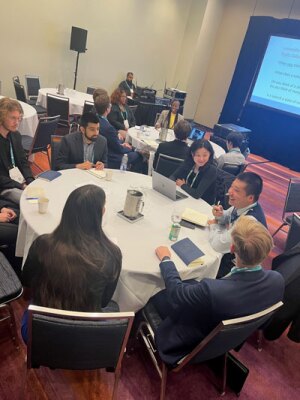At the 2023 ULI Spring Meeting in Toronto, a session discussing Emerging Trends in Real Estate®session, hosted by the Institute’s University Connectionsprogram, shed light on younger generation’s perceptions of suburbs and the shifting preferences of students when it comes to choosing where to live and work post-graduation.
Led by Anita Kramer, senior vice president of ULI’s Center for Real Estate Economics and Capital Markets, the session started with a presentation of market prospect trends in the last few years of Emerging Trends in Real Estate ® United States and Canada. Most of the students believe the economic outlook for the real estate industry over the next six months would not be “good” or “poor,” but a more neutral “fair.”
Kramer then posed two discussion questions to the students about the characteristics associated with suburbs and the factors influencing young professionals’ decisions about their future cities.
Rethinking Suburbs
Students were prompted to reflect on their perceptions of suburbs and what defines them. The discussion revealed a diverse range of thoughts:
- Uniformity in design, tranquility away from city noise, and economic dependence on nearby urban areas were some of the commonly shared perceptions.
- Students also noted that suburbs are typically characterized by single-family homes, low-density development, car-centric lifestyles, and their proximity to highways.
- There was a recognition of demographic distinctions between suburbs and cities, with families gravitating toward suburban areas and young professionals favoring urban centers.
- Additionally, the students acknowledged that media and movies often perpetuate and reinforce these ideas.
However, the participants also critically analyzed the concept of suburbs, noting that it is more than just physical attributes. They emphasized that the idea of suburbia is a state of mind, shaped by historical and generational changes. Furthermore, suburbs were associated with environmental concerns related to energy consumption and resource usage.
Kramer shared her insights on the impact of millennials on cities, highlighting the rise of “hipsturbia” where many millennials have chosen to reside. She echoed the sentiment that suburbs cannot thrive if they lack connection to vibrant urban areas.
Gen Z’s City Preferences
The conversation then shifted to the aspirations of these young students and the factors influencing their desired future cities:
The cost of living emerged as a significant concern for many, as they weighed the affordability of urban cores against more affordable options in edge cities. Family ties played a vital role, with students wanting to live where their families are. The students also expressed a desire to positively impact their chosen community, suggesting that they would choose a city based on opportunities for meaningful engagement.
Social and physical job requirements were identified as potential limitations to career choices, as specific industries might be more concentrated in certain cities. Finally, intentional placemaking emerged as a key consideration, reflecting a desire for cities that prioritize creating vibrant and inclusive spaces.
The University Connections program acts as a crucial bridge between higher education institutions, aspiring students, and ULI’s vast array of resources, serving as a catalyst for cultivating a diverse generation of future real estate leaders. By offering a range of educational initiatives, networking opportunities, and competitions, ULI empowers students to explore the multifaceted world of commercial real estate and discover the numerous career pathways available within the industry.
JAMI PASQUINELLII is a senior manager with ULI University Connections.





